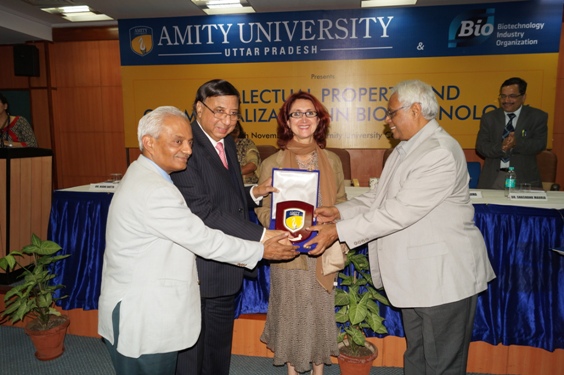13 Nov 2013|Noida | Amity University Campus, Sector-125 Noida
Workshop on “Intellectual Property (IP) and Commercialization in Biotechnology” at Amity University

Amity University and Biotechnology Industry Organisation (BIO) jointly organized a Workshop on “Intellectual Property (IP) and Commercialization in Biotechnology” at Amity Campus, Sector- 125, Noida.
The half a day workshop, sponsored by BIO, was aimed at exploring the basics of Intellectual Property Protection, especially patent protection and speakers illustrated real world examples of how Scientists commercialize and make their discoveries available to the public by leveraging their IP. The workshop was organized by Dr Abha Agnihotri, Head, Center for Agricultural Biotechnology & Professor Amity Institute of Microbial Technology (AIMT), Dr Amit C Kharkwal, Dy. Director & Head, AIMT and Mr. Roy Zwahlen, Associate Counsel, Biotechnology Industry Organization under the mentorship of Prof. Dr. Ajit Varma- Distinguished Scientist and Professor of Eminence, Amity Institute of Microbial Technology.
Welcoming the august gathering, Prof. Dr. Ajit Varma stated the role of patenting the research outcomes and participating in worldwide Intellectual Property (IP) Systems. Talking about the Workshop, Dr. Varma outlined various topics which were to be covered during the Workshop including “Basic Biotech Patenting” and “Systemic Approaches to commercializing University IP”.
During the Workshop, prolific speakers and panelists from BIO, Government of India, Industry, Legal Community and Amity University shared their views with the audience including Ms. Kalpana Reddy- First Secretary for IP (South Asia) USPTO, The American Center, Ms. Lila Feisee- Vice President, International Affairs, BIO, Dr. R K Gupta- Advisor, Innovation Protection Unit, CSIR, Dr. Chandrasekhar Tanikella- Director and Head, Patent Facilitating Centre, TIFAC, Dr S Mauria- ADG, Intellectual Property and Technology Management, ICAR, Dr S Srivastava- Scientist, ICMR, and others.
The first session on “Basic Biotech Patenting: A Comparative Study” was chaired and moderated by Ms. Kalpana Reddy- First Secretary for IP – South Asia, USPTO, The American Center. Presenting her views she defined Biotechnology as technology based on Biology, harnessing cellular and biomolecular processes to develop technologies and products that help improve our lives and health of our planet. Talking about the scope of the protection of biotechnology inventions in different countries, the speaker said that in U S “anything under the sun that is made by man with markedly different characteristics from any found in nature” is patentable. Referring to the Biotechnology Patenting in EU, Ms. Reddy said that under the European Patent Convention (EPC), Article 52 (2), mere “discoveries” are not considered inventions and are thus, not patentable. “Discovery” encompasses products of nature as such. Dwelling on Biotechnology Patenting in Japan, she stated that as per Patent Act of 1959 (amended 2008), Patents are available to any person who has made an invention which is industrially applicable. The Examination Guidelines for Patent and Utility Model in Japan provide comprehensive and detailed guidance concerning the presentation and examination of claims directed to full and partial gene sequences, proteins and DNA.
The second session on “Systemic Approaches to commercializing University IP” was chaired and moderated by Ms Lila Feise, Vice President, International Affairs, Biotechnology Industry Organization (BIO). She highlighted the role of public private partnership in turning university research into commercially viable products. Citing examples from University of Virginia and Singapore she emphasized the role of appropriate investments and availability of venture capital for meaningful boost of bio-economy at international level.
Dr S Mauria, ADG (Intellectual Property & Technology Management), ICAR while giving an overview of IP Scenario in Indian Agriculture spoke about the relevance of Protection of Plant Varieties and Farmers’ Rights Act, Patents Act, Geographical Indications Act and Biological Diversity Act for technology commercialization dimensions in the public sector National Agricultural Research System. Dr. R K Gupta- Advisor, Innovation Protection Unit, CSIR said that the mission of CSIR is to provide scientific industrial R&D that maximizes the economic, environmental & societal benefits for the people of India. He cited interesting examples of collaborative innovations from CSIR labs and their commercialization including streptokinase. Dr. Chandrasekhar Tanikella- Director and Head, Patent Facilitating Centre, TIFAC emphasized the role of women scientists in research and innovations and newly launched schemes of DST to encourage women participation in IP generation. Dr S Srivastava- Scientist ICMR enlightened the role of IP in medical research and pharmaceuticals in Indian context. Dr. Nidhi Datta- Scientist ICGEB shared that ICGEB is committed to support translational research and has policy guidelines for IPR and licensing, which has led to successful technology transfers such as Dengue Diagnostics, HIV Diagnostic intermediates etc. Mr. Ashwani Balayan- Partner Intellectual Property, Patents & Designs, ALG India Law Offices and Dr Neeti Wilson- Partner, Anand & Anand shared their views on patentable and non patentable innovations in biotechnology within the provisions of Indian Patent Act and Legal perspectives for Patenting Biotechnology innovations in India. Dr Abha Agnihotri- AIMT and Dr Pankaj Sharma- AIB, Amity University shared their views on importance of IP in Biotechnology and presented some case studies of commercialization.
During the Workshop, Dr. Ashok K Chauhan- Founder President, Amity Group and Dr. W Selvamurthy- President (Honorary)- Amity Science, Technology and Innovation Foundation and Chair Professor for Life Sciences also shared their distinguished views with the gathering.